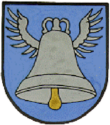Afonso IV[1] (Portuguese pronunciation: [?''fõsu]; 8 February 1291 – 28May 1357), called the Brave (Portuguese: o Bravo), was King of Portugaland the Algarve from 1325 until his death. He was the only legitimate sonof King Denis of Portugal by his wife Elizabeth of Aragon.
Afonso, born in Lisbon, was the rightful heir to the Portuguese throne.However, he was not, Denis'' favourite son; the old king preferred hisillegitimate son Afonso Sanches. The notorious rivalry between halfbrothers led to civil war several times. On 7 January 1325, Afonso''sfather died and he became king, whereupon he exiled his rival to Castile,and stripped him of all the lands and fiefdom given by their father.Afonso Sanches, however, did not sit still. From Castile, he orchestrateda series of attempts to usurp the crown for himself. After a few failedattempts at invasion, the brothers signed a peace treaty, arranged byAfonso''s mother Queen Isabel Elizabeth.
In 1309, Afonso IV married Infanta Beatrice of Castile, daughter of KingSancho IV of Castile by his wife Maria de Molina. The first-born of thisunion, Infanta Maria of Portugal, married King Alfonso XI of Castile in1328, although her husband soon became involved publicly with a mistress.Maria returned to her father after bearing Alfonso XI the heir he neededin 1334. The public humiliation of his daughter led her father to marryhis own heir, who became Peter I of Portugal, to another Castilianinfanta, Constance of Peñafiel. Afonso IV also started a war againstCastile. Peace arrived four years later, through the intervention ofInfanta Maria herself. A year after the peace treaty was signed inSeville, Portuguese troops played an important role in defeating theMoors at the Battle of Rio Salado in October 1340.
Political intrigue marked the last part of Afonso IV''s reign, althoughCastille was torn by civil war after Alfonso XI died. Henry of Trastámarachallenged the new King Pedro of Castile, who sent many Castilian noblesinto exile in Portugal. Afonso''s heir, Pedro fell in love with his newwife''s lady-in-waiting, Inês de Castro. Inês was the daughter of animportant noble family from Galicia, with links (albeit illegitimate) toboth the royal houses of Castile and Portugal. Her brothers were alignedwith the Trastamara faction, and became favorites of crown prince Pedro,much to the dismay of others at the Portuguese court, who considered themCastilian upstarts. When Constance of Penafiel died weeks after givingbirth to their third child, Pedro began living openly with Inês,recognized all her children as his and refused the idea of marryinganyone other than Inês herself. His father refused to go to war againagainst Castile, hoped his heir''s infatuation would end, and tried toarrange another dynastic marriage for Pedro.
The situation became worse as the years passed and the aging Afonso lostcontrol over his court. His grandson and Pedro''s only legitimate son,future king Fernando of Portugal, was a sickly child, while Inês''illegitimate children thrived. Worried about his legitimate grandson''slife, and the growing power of Castile within Portugal''s borders, Afonsoordered Inês de Castro first imprisoned in his mother''s old convent inCoimbra, and then murdered in 1355. He expected his son to give in andmarry a princess, but the heir became enraged upon learning of hislover''s decapitation in front of their young child. Pedro put himself atthe head of an army and devastated the country between the Douro and theMinho rivers before he was reconciled to his father in early 1357. Afonsodied almost immediately after, in Lisbon in May.
Afonso IV''s nickname the Brave alludes to his martial exploits. However,his most important contributions were the relative peace of his longreign and the importance he gave to the Portuguese navy. Afonso IVgranted public funding to raise a proper commercial fleet and ordered thefirst maritime explorations. The conflict with Pedro, and eventually theexplorations they began, became the foundation of the Portuguese nationalepic, Os Lusíadas by Luís de Camões. The dramatic situation betweenfather and son and Inês, became plots in more than twenty operas, as wellas "Nise lastimosa" and "Nise laureada" (1577) by Jerónimo Bermúdez,''Reinar despues de morir'' by Luís Vélez de Guevara, "Inez de Castro" byMary Russell Mitford, and La Reine morte (The Dead Queen) by Henry deMontherlant.[2]
Afonso married Beatrice of Castile (1293–1359) in 1309, daughter ofSancho IV, King of Castile, and María de Molina and had four sons andthree daughters.
Afonso, born in Lisbon, was the rightful heir to the Portuguese throne.However, he was not, Denis'' favourite son; the old king preferred hisillegitimate son Afonso Sanches. The notorious rivalry between halfbrothers led to civil war several times. On 7 January 1325, Afonso''sfather died and he became king, whereupon he exiled his rival to Castile,and stripped him of all the lands and fiefdom given by their father.Afonso Sanches, however, did not sit still. From Castile, he orchestrateda series of attempts to usurp the crown for himself. After a few failedattempts at invasion, the brothers signed a peace treaty, arranged byAfonso''s mother Queen Isabel Elizabeth.
In 1309, Afonso IV married Infanta Beatrice of Castile, daughter of KingSancho IV of Castile by his wife Maria de Molina. The first-born of thisunion, Infanta Maria of Portugal, married King Alfonso XI of Castile in1328, although her husband soon became involved publicly with a mistress.Maria returned to her father after bearing Alfonso XI the heir he neededin 1334. The public humiliation of his daughter led her father to marryhis own heir, who became Peter I of Portugal, to another Castilianinfanta, Constance of Peñafiel. Afonso IV also started a war againstCastile. Peace arrived four years later, through the intervention ofInfanta Maria herself. A year after the peace treaty was signed inSeville, Portuguese troops played an important role in defeating theMoors at the Battle of Rio Salado in October 1340.
Political intrigue marked the last part of Afonso IV''s reign, althoughCastille was torn by civil war after Alfonso XI died. Henry of Trastámarachallenged the new King Pedro of Castile, who sent many Castilian noblesinto exile in Portugal. Afonso''s heir, Pedro fell in love with his newwife''s lady-in-waiting, Inês de Castro. Inês was the daughter of animportant noble family from Galicia, with links (albeit illegitimate) toboth the royal houses of Castile and Portugal. Her brothers were alignedwith the Trastamara faction, and became favorites of crown prince Pedro,much to the dismay of others at the Portuguese court, who considered themCastilian upstarts. When Constance of Penafiel died weeks after givingbirth to their third child, Pedro began living openly with Inês,recognized all her children as his and refused the idea of marryinganyone other than Inês herself. His father refused to go to war againagainst Castile, hoped his heir''s infatuation would end, and tried toarrange another dynastic marriage for Pedro.
The situation became worse as the years passed and the aging Afonso lostcontrol over his court. His grandson and Pedro''s only legitimate son,future king Fernando of Portugal, was a sickly child, while Inês''illegitimate children thrived. Worried about his legitimate grandson''slife, and the growing power of Castile within Portugal''s borders, Afonsoordered Inês de Castro first imprisoned in his mother''s old convent inCoimbra, and then murdered in 1355. He expected his son to give in andmarry a princess, but the heir became enraged upon learning of hislover''s decapitation in front of their young child. Pedro put himself atthe head of an army and devastated the country between the Douro and theMinho rivers before he was reconciled to his father in early 1357. Afonsodied almost immediately after, in Lisbon in May.
Afonso IV''s nickname the Brave alludes to his martial exploits. However,his most important contributions were the relative peace of his longreign and the importance he gave to the Portuguese navy. Afonso IVgranted public funding to raise a proper commercial fleet and ordered thefirst maritime explorations. The conflict with Pedro, and eventually theexplorations they began, became the foundation of the Portuguese nationalepic, Os Lusíadas by Luís de Camões. The dramatic situation betweenfather and son and Inês, became plots in more than twenty operas, as wellas "Nise lastimosa" and "Nise laureada" (1577) by Jerónimo Bermúdez,''Reinar despues de morir'' by Luís Vélez de Guevara, "Inez de Castro" byMary Russell Mitford, and La Reine morte (The Dead Queen) by Henry deMontherlant.[2]
Afonso married Beatrice of Castile (1293–1359) in 1309, daughter ofSancho IV, King of Castile, and María de Molina and had four sons andthree daughters.
- 8 FEB 1291 - Birth - ; Lisbon, Kingdom of Portugal
- 28 MAY 1357 - Death - ; Lisbon, Kingdom of Portugal
- 7 JAN 1325 - Reign - King ; Portugal and the Algarve
? | ||||||
? | ||||||
? | ||||||
? | ||||||
? | ||||||
? | ||||||
| PARENT (U) ? | |||
| Birth | |||
| Death | |||
| Father | ? | ||
| Mother | ? | ||
| PARENT (U) ? | |||
| Birth | |||
| Death | |||
| Father | ? | ||
| Mother | ? | ||
| CHILDREN | |||
| M | Afonso IV of Portugal | ||
| Birth | 8 FEB 1291 | Lisbon, Kingdom of Portugal | |
| Death | 28 MAY 1357 | Lisbon, Kingdom of Portugal | |

